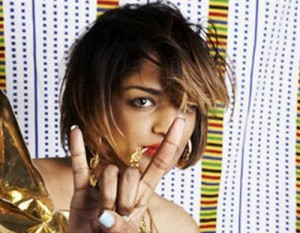 “M.I.A.. Third World Democracy. Heh. I got more records than the KGB… so uh, no funny business.”
“M.I.A.. Third World Democracy. Heh. I got more records than the KGB… so uh, no funny business.”
I’ve found that those lines are most potent and pregnant with meaning when spouted from atop a table as though you’re Eva Perón on the balcony. Or maybe just Madonna playing her in Evita. Better yet, just half-naked, sweaty and pursing your lips like a virgin atop a table rising out of an ocean of your friends and loved ones.
The crux here is that no matter how much M.I.A.’s lyrics make you want to get up and shout and fire make-believe pistols into the air and open imaginary cash registers and generally dance like a funk puppet on technicolor strings—you will look like a fool doing so. Just accept this.
Of course, that is no reason to hang up the fantasy six-guns. I keep mine holstered at all times, should a spontaneous dance party ignite.
M.I.A., or Mathangi “Maya” Arulpragasam, is nearly as hard to pin down in persona as her music is in genre. Rather than grocery list all the categories of music that may even partly apply, I’ll just nod in the direction of her Myspace profile—the color scheme of which is enough to send both you and your browser into an epileptic fit—where it’s listed as “Other.”
As in: To Be Determined, Not Applicable, None of the Above.
But we’re humans, so we’re interested in labels. For instance, her moniker is alternately said to stand for Missing In Action and Missing In Acton, the latter being a suburb in West London where Maya spent part of her childhood. Though born in England, she actually spent many of her early years on the run in Sri Lanka as her father became a political activist in support of the Tamil Tigers. After too many bullets were fired in their direction, Maya and her mother, Kala, fled to India, then back to Sri Lanka (in Jaffna) and eventually to the UK. Infrequent visits from her increasingly implicated father quickly withered into none at all. Her first album was actually an attempt to reach out to this man as it was named after her father’s own self-made handle, Arular.
As in: Hey, Dad, I know you’re inciting revolution and all, but remember us?
Surprisingly, improbably, and only a little like the plot of Joe Dirt: it worked. Arular contacted Maya to tell her to change the name of the album.
The album Arular though, met with huge success in the UK and US. Shortly after it was decided that Maya would cut her next album with Timbaland (the King Midas of producing), the United States made a decision of its own. Denied a visa for unspecified reasons—ah, the Patriot Act—Maya was therefore also without her apartment in New York and every scrap of recording equipment she owned therein.
No choice but to go “couch surfing.” Candidly describing this crossroads in an interview with The List, Maya officially went M.I.A:
“I wanted to get out of people’s view: to go and spend time learning about myself and trying to be better. Not really technically better, but I just wanted to be better as a human being. And it’s really hard to do that when you make club music.”
And for all of us who may writhe on the floor (in a good way, if there is a good way) to “Shout” but can’t seem to pull ourselves away from the table when confronted with Lil Jon, Maya is savvy.
“There’s no such thing as a better human being in club music!” she says. “It’s like, you either dance…or you get the f— out! And I don’t want to be talking about ‘big titties’ and ‘f—ing hos.’ Dance music needs to be expanded, in terms of subject matter and substance, and that’s what I was trying to do.”
And so out of the ashes of bureaucracy and the dancehall status quo rose Kala.
Furious as it is mesmeric and named for her mother—sensing a pattern?—Kala has been nominated for Record of the Year, to be decided at the Grammys on February 8th. M.I.A.’s competition is steep and includes Leona Lewis and Adele and even uber-established heavyweights like Coldplay and Robert Plant (with Alison Krauss).
“Paper Planes,” the keynote track from Kala, has enjoyed saturation to the point of obsession. Even those who have made a home beneath a geological formation will at least recognize the tempo from the Pineapple Express trailers.
It’s also the origin of the lyrics at the beginning of this article and the inspiration for millions to abandon dignity and just fire their fingers into the air.
On Youtube.com, you’ll find an insurmountable amount of videos in relation to “Paper Planes” alone. I spent about an hour going over a mere fraction of what’s available, in awe and perplexity. People have remixed it with other songs and with itself. Some have performed it acoustically, while others have been content to just karaoke while it blasts in the background. Some just mouth the words. Most just dance.
Someone even made a very, very poor parody featuring Sarah Palin: “Come to Alaska, hunt moose all day! I’m a platinum member of the N.R.A.”
While there are certainly exceptions, most online performers of “Paper Planes” are white girls between the ages of ten and twenty. There are a lot of braces, big sunglasses, and Monopoly bills. The setting is almost invariably a pink bedroom or dorm room. Participants are almost never less than two, but up to around six in number, and there is always a diva that enjoys the limelight a little too much. And as with the song “Jane Says,” everybody thinks they know the words until they get past the first line. Then it’s just a lot of progressively sillier dancing until the bullet-riddled chorus.
The high school senior in a red nightie, the eight-year-old girl on a fire escape, the emo girls about to wreck in their car, and the probably-inappropriate-if-you-slowed-it-down, stop-motion teenagers: they all have one thing in common. That, of course, is how to put two fingers together and shoot the sky.
But while the online community might suggest a demographic closer to “Hit Me Baby One More Time,” M.I.A.’s stimulation of dancing is as prolific as Soulja Boy’s “Superman”—actually, one video tries out this theory by doing “the Superman” to “Paper Planes.”
Happily, even Maya seems to accept how silly the finger-fire gesture is and smiles coyly as she does it in the music video and on stage. Similarly, her cohorts, professional back-up singers, dancers and hangers-on look just as ridiculous when they do it.
So maybe there’s hope that I’m not just a white boy who can’t dance but likes gyrating to a song built around muzzle blasts and cash registers. Or I justify it by thinking its lurid nature is in fact M.I.A.’s protest of Western culture, world economy, and the white embrace. It’s probably both, but the only thing we can ever really be sure of in this world is that I will look preposterous when dancing, especially to this song. And maybe that’s the genius, because “all I wanna do is BANG BANG BANG BANG, and a KA-CHING, and take your money.”












